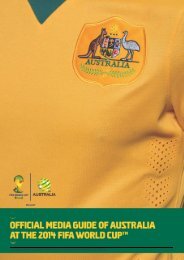AFWC14MG
AFWC14MG
AFWC14MG
- No tags were found...
Create successful ePaper yourself
Turn your PDF publications into a flip-book with our unique Google optimized e-Paper software.
The early years – pre-FederationAUSTRALIAN NATIONAL TEAM HISTORYAustralia's first official international matches wereplayed as part of a tour to New Zealand in 1922. Whilethe two losses and a draw in the three-match seriesagainst the New Zealand national side did not make fora good start, it was nevertheless a historic phase inAustralia's football history.Australia’s first international win came a year later,when New Zealand made a return trip to Australia.Over the next four decades, Australia's opponents weremostly from the Commonwealth. In addition to manyhome and away matches against the Kiwis, teams fromCanada, India, England and South Africa occasionallytoured Down Under, while the Australians venturedabroad to places such as the Dutch East Indies (nowIndonesia), Rhodesia (now Zimbabwe) and South Africa.With limited budgets and scant resources for footballin Australia at the time, there was little opportunity forprofessionalism, with virtually all players having tobalance their footballing careers with full-time workand family life. And in an era where passenger airtravel was in its infancy and transport by sea andrailway was the norm, national team tours were verylong - sometimes lasting for months.In those days, a commitment to the Australian nationalteam was a major devotion to the cause. It was aninvolvement at a completely different level to today,and set a lasting foundation that seems yet to be fullyappreciated by the bulk of today's football community.Highlights of the first 40 years of the Australian nationalteam include huge victories over arch-rivals NewZealand in 1936, a successful tour of southern Africa in1950, and the 1956 Melbourne Olympic Games - wherethe Aussies won their opening match against Japan.The aftermath of the Second World War saw waveafter wave of migrants come to Australia with manybringing their passion for football to these shores.Scores of 'ethnic-based' teams made their way ontothe scene, together with regular visits from high-profileEuropean sides. The effects of this influx of 'newAustralians' is evident in successive generations, withthe bulk of Australia’s top players in the decade beforeand after the turn of the 21st century having familyroots from the post World War II European migrants.The late 1950s saw some controversial administrativechanges to football in this country, and for a variety ofreasons Australia ceased to be officially recognised byFIFA, the game's worldwide governing body, in 1959. Asa result, Australia was banned from playing internationalfootball. In 1963 the dispute with FIFA was resolved, andAustralia became a fully fledged member of the world’sgoverning body – a Federation in its own right.Post-Federation – and a world title to aim forAustralia's first full international matches played afterFederation were also its first attempt at qualifying for aFIFA World Cup. Following a number of withdrawalsfrom Asian countries it turned out that Australia,Oceania's only entrant, merely had to play-off againstNorth (DPR) Korea for the right to be at the 1966 FIFAWorld Cup. An under-prepared Australian side wasconvincingly beaten by North Korea over the two legs –a North Korean side which went on to reach thequarter finals at England '66.The qualifying process for the 1970 FIFA World Cup wasa truly marathon campaign. Australia finished first in aninitial tournament in South Korea (Korea Republic),which was followed by a three match series againstRhodesia, played in the space of six days in 'neutral'Mozambique. Following the eventual victory over theAfricans was a home and away final qualification tieagainst Israel. Inspired by captain Johnny Warren, theend result was the closest of losses over the two legs.Australia’s next World Cup campaign however provedmuch more successful and after another rigorous firstphase of qualifying, the Peter Wilson-led Aussies metSouth Korea for a place in the 1974 finals. After both thehome and away legs ended in draws, a deciding gametook place in Hong Kong where Jimmy Mackay’s longrange strike became part of Australian sporting folklore.Australia won the play-off 1-0, ensuring the county’s firstparticipation in a FIFA World Cup finals tournament.The World Cup was a totally different experience forAustralia’s part-timers, up against fullly professionalplayers from nations where the sport was like a religion.Coached by Rale Rasic, Australia’s first two 1974 WorldCup matches were against East Germany (a 2-0 loss) andhosts and eventual winners West Germany (a 3-0 loss).1974 FIFA WORLD CUPWest GermanyGDRL0-2FRGL0-3CHID0-0Attila Abonyi ◦ •Adrian Alston • • •Branko Buljevic • • •Ernie Campbell•Colin Curran • • •Jim Mackay • • •Peter Ollerton ◦ ◦Jack Reilly • • •Ray Richards • • •Jimmy Rooney • • •Manfred Schaefer • • •Doug Utjesenovic • • •Johnny Warren •Harry Williams◦Peter Wilson (c) • • •• started ◦ substituteOFFICIAL MEDIA GUIDE OF AUSTRALIA AT THE 2014 FIFA WORLD CUP BRAZIL 78





